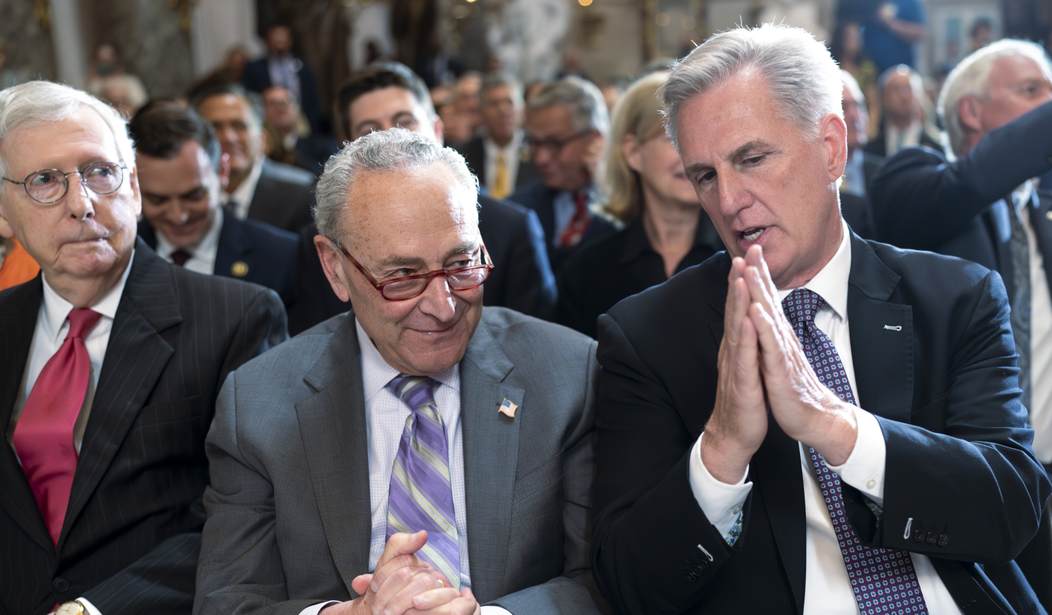Democrats and Republicans reached an agreement to lift the debt ceiling, and nothing is going to change in the disturbing pattern of America's national debt climbing by leaps and bounds. The best reason for pessimism? Our Democrat-messaging media. They can't be bothered to offer the most basic facts in budget coverage.
What is the budget for the current fiscal year? What was the last budget deficit? How large is the national debt? These are questions that are rarely answered by news anchors. What we get is a lot of horse-race jockeying and finger-pointing instead of facts. They must think the viewers are too stupid to juggle numbers.
Rich Noyes of the Media Research Center studied all 74 evening-news stories on the spending debate from Jan. 1 through May 27, when agreement was struck. It's not pretty.
The Congressional Budget Office reports discretionary federal spending amounted to $1.3 trillion in 2019, before surging during the COVID years, topping at $1.7 trillion during 2022. The original GOP plan -- before it was diluted in negotiations with Team Biden -- would have pared that back to just under $1.5 trillion.
Yet in nearly one-fourth of stories (17 out of 74), reporters cast this proposal as extreme, using terms like "deep," "steep," "slash" and "gut" to characterize Republican proposals. This, to be blunt, is "Pants On Fire" false.
ABC's Mary Bruce described the GOP plan as brutal, "deep spending cuts that would gut (Biden's) agenda, slashing social spending and environmental programs." NBC's Peter Alexander said, "Key conservative Republicans who have the power to derail any deal are urging McCarthy to hold out until Democrats slash more spending."
Recommended
Who was to blame for the impasse? Out of 44 soundbites from anchors, reporters and a handful of nonpartisan sources, 21 blamed Republicans, 23 blamed both sides and zero blamed only Democrats.
Only one party had hardliners. CBS reporter Christina Ruffini warned "hardline members" of the GOP could scuttle a deal. ABC's Rachel Scott described "ultraconservative members of Congress" pushing McCarthy to "drive an even tougher bargain."
The Republicans were blamed for "hostage taking" and heading for "catastrophe" for trying to (modestly) cut spending, but the leftists won't draw any of that blame if they refuse to vote for this deal because of work requirements. No anchor will ask if holding out and risking horror-movie disaster is better than merely asking able-bodied people to work if they can.
Media coverage is part of the negotiations. Democrats arrive at the table knowing they have the upper hand, that they can accuse the other party of "slashing" money for old people or veterans or school lunches and face no "fact-checking." Democrats aren't singled out for being extreme.
Noyes found a similar result when examining evening-news budget stories going back to 2018. Reporters never criticized the size of the most massive spending bills (more than $1 trillion) passed by Congress.
Viewers heard 301 Democrat-enabling statements recounting the benefits provided by these various spending bills versus just five statements (all from Republicans) about their impact on the national debt.
The coverage included three times as many complaints that these enormous spending bills were too small or omitted too much (63) than observations that they were too big or too expensive (20 statements, again, all from Republicans).
Our national media should be blamed for the size of the national debt. For decades, they've used the wild "slash and gut" talk to try and scare Republicans out of any attempt at spending restraint. Collectively, they put their fat foot on the gas pedal and punish any lunge for the brakes.

























Join the conversation as a VIP Member